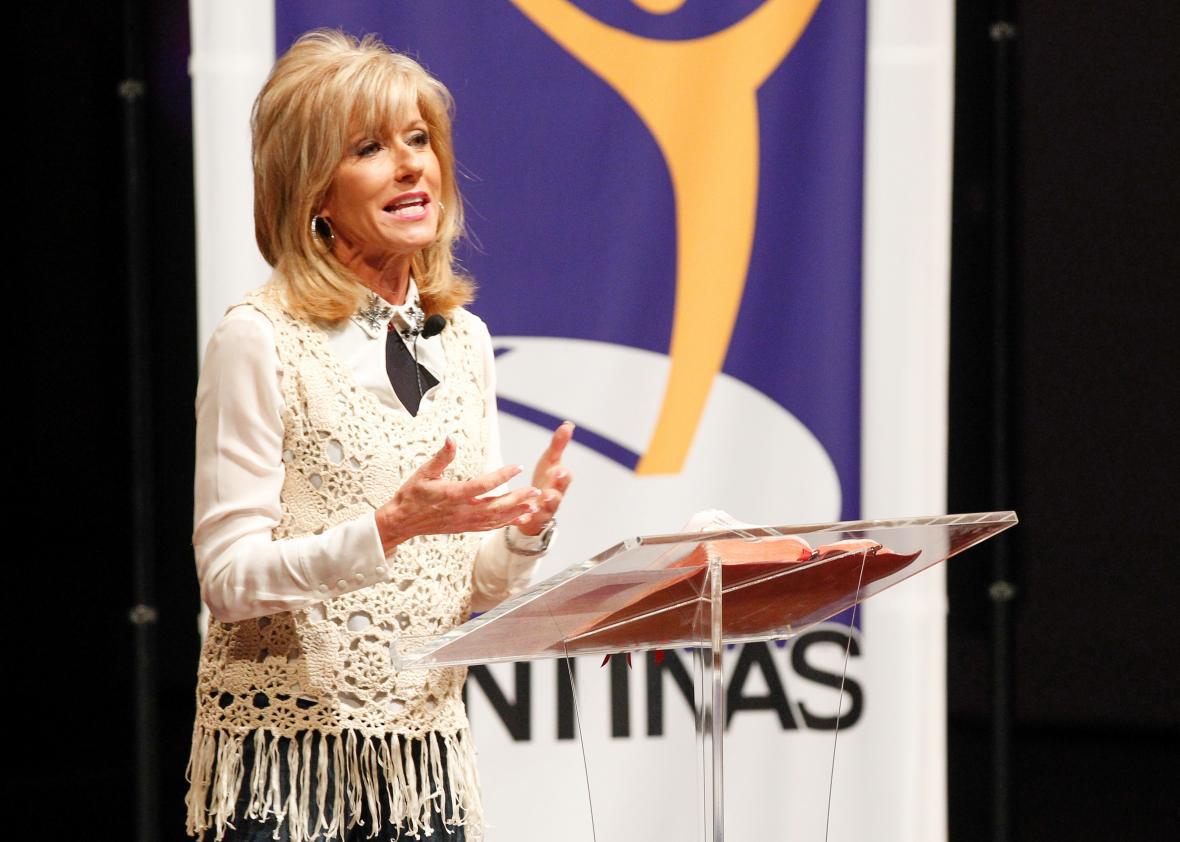Do white evangelical Christians support Donald Trump? It’s a surprisingly difficult question to answer. Church-going evangelicals loathed him during the primary, then by autumn they had come around to his side. Now a poll taken after the vile Access Hollywood tape emerged last week suggests another reversal is underway, with Trump leading Hillary Clinton by just 1 percentage point among self-identified evangelicals.
Evangelical leaders are as divided as their flock. Trump’s vocal supporters include Dallas pastor Robert Jeffress and Liberty University President Jerry Falwell Jr.; his principled antagonists include Christianity Today editorial director Andy Crouch and the policy head of the Southern Baptist Convention, Russell Moore. But now, a new group of influencers is speaking up to oppose Trump: evangelical women.
On Sunday morning, speaker and Bible study author Beth Moore (no relation to Russell) tweeted in response to the new tapes:
Make no mistake: Beth Moore is a bigger deal than Jerry Falwell Jr. She has sold millions of books, speaks to huge crowds, and hosts a popular national radio program. And Moore is not the only powerful evangelical woman speaking out against Trump. Others include popular singer-songwriter Sara Groves, authors Christine Caine and Trillia Newbell, and radio host Julie Roys. Author and HGTV television personality Jen Hatmaker has been an outspoken Trump opponent since last year, despite her generally conservative audience; on Tuesday, she wrote on Facebook that she was “sorry and furious that we now have a presidential candidate not only degrading women but normalizing sexual assault.”
As Anglican pastor Tyler Wigg-Stevenson smartly observed, Hatmaker has more Twitter followers than Falwell and his fellow Trump supporters Ralph Reed (former Christian Coalition head), James Dobson (Focus on the Family founder), and Tony Perkins (Family Research Council president) combined. Oh, and she has almost six times as many Facebook followers as Twitter followers. Her 2015 book about “contentment in a world of impossible standards” was a New York Times best-seller, and if you want to see her speak next week at the USF Sun Dome Arena in Tampa, it could cost you up to $149.
But these women are often underestimated as influencers, both from within the evangelical world and outside it. In conservative corners of evangelicalism, the question of whether and how women can properly serve as spiritual teachers is a sensitive topic. “I’m a guy,” a questioner asked the influential pastor and author John Piper in 2010. “Is it wrong for me to listen to Beth Moore?” It’s OK to listen, but be careful not to “become dependent on her as your shepherd,” Piper answered. “There is a certain dynamic between maleness and femaleness that when a woman begins to assume an authoritative teaching role in your life the manhood of a man and the womanhood of a woman is compromised.”
In that setting, it’s no wonder that many ambitious and talented women have looked outside traditional power structures to create venues for their voices. Indeed, most of the evangelical women speaking out against Trump have built their own platforms of authority, instead of rising to the top of existing institutions. They are artists and interpreters, not presidents and pastors. Their squishier job titles mean their power is less easy to prove, which makes them less appealing to journalists in search of evangelical leaders to quote. And many of them are speaking overwhelmingly to women.
If Moore’s and Hatmaker’s names aren’t familiar to you, however, that’s not because they’re not important. It’s because they’re not talking to you. But that doesn’t mean their audience isn’t huge—and listening carefully.
